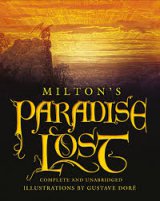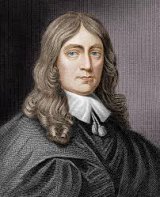Paradise Lost Page #13
Paradise Lost is an epic poem in blank verse by the 17th-century English poet John Milton. The first version, published in 1667, consisted of ten books with over ten thousand lines of verse. A second edition followed in 1674, arranged into twelve books with minor revisions throughout and a note on the versification.
Thus while God spake, ambrosial fragrance fill’d All Heav’n, and in the blessed Spirits elect Sense of new joy ineffable diffus’d: Beyond compare the Son of God was seen Most glorious, in him all his Father shon Substantially express’d, and in his face Divine compassion visibly appeerd, Love without end, and without measure Grace, Which uttering thus he to his Father spake. O Father, gracious was that word which clos’d Thy sovran sentence, that Man should find grace; For which both Heav’n and Earth shall high extoll Thy praises, with th’ innumerable sound Of Hymns and sacred Songs, wherewith thy Throne Encompass’d shall resound thee ever blest. For should Man finally be lost, should Man Thy creature late so lov’d, thy youngest Son Fall circumvented thus by fraud, though joynd With his own folly? that be from thee farr, That farr be from thee, Father, who art Judge Of all things made, and judgest onely right. Or shall the Adversarie thus obtain His end, and frustrate thine, shall he fulfill His malice, and thy goodness bring to naught, Or proud return though to his heavier doom, Yet with revenge accomplish’t and to Hell Draw after him the whole Race of mankind, By him corrupted? or wilt thou thy self Abolish thy Creation, and unmake, For him, what for thy glorie thou hast made? So should thy goodness and thy greatness both Be questiond and blaspheam’d without defence. To whom the great Creatour thus reply’d. O Son, in whom my Soul hath chief delight, Son of my bosom, Son who art alone My word, my wisdom, and effectual might, All hast thou spok’n as my thoughts are, all As my Eternal purpose hath decreed: Man shall not quite be lost, but sav’d who will, Yet not of will in him, but grace in me Freely voutsaft; once more I will renew His lapsed powers, though forfeit and enthrall’d By sin to foul exorbitant desires; Upheld by me, yet once more he shall stand On even ground against his mortal foe, By me upheld, that he may know how frail His fall’n condition is, and to me ow All his deliv’rance, and to none but me. Some I have chosen of peculiar grace Elect above the rest; so is my will: The rest shall hear me call, and oft be warnd Thir sinful state, and to appease betimes Th’ incensed Deitie, while offerd grace Invites; for I will cleer thir senses dark, What may suffice, and soft’n stonie hearts To pray, repent, and bring obedience due. To prayer, repentance, and obedience due, Though but endevord with sincere intent, Mine eare shall not be slow, mine eye not shut. And I will place within them as a guide My Umpire Conscience, whom if they will hear, Light after light well us’d they shall attain, And to the end persisting, safe arrive. This my long sufferance and my day of grace They who neglect and scorn, shall never taste; But hard be hard’nd, blind be blinded more, That they may stumble on, and deeper fall; And none but such from mercy I exclude. But yet all is not don; Man disobeying, Disloyal breaks his fealtie, and sinns Against the high Supremacie of Heav’n, Affecting God-head, and so loosing all, To expiate his Treason hath naught left, But to destruction sacred and devote, He with his whole posteritie must die, Die hee or Justice must; unless for him Som other able, and as willing, pay The rigid satisfaction, death for death. Say Heav’nly Powers, where shall we find such love, Which of ye will be mortal to redeem Mans mortal crime, and just th’ unjust to save, Dwels in all Heaven charitie so deare? He ask’d, but all the Heav’nly Quire stood mute, And silence was in Heav’n: on mans behalf Patron or Intercessor none appeerd, Much less that durst upon his own head draw The deadly forfeiture, and ransom set. And now without redemption all mankind Must have bin lost, adjudg’d to Death and Hell By doom severe, had not the Son of God, In whom the fulness dwels of love divine, His dearest mediation thus renewd. Father, thy word is past, man shall find grace; And shall grace not find means, that finds her way, The speediest of thy winged messengers, To visit all thy creatures, and to all Comes unprevented, unimplor’d, unsought, Happie for man, so coming; he her aide Can never seek, once dead in sins and lost; Attonement for himself or offering meet, Indebted and undon, hath none to bring: Behold mee then, mee for him, life for life I offer, on mee let thine anger fall; Account mee man; I for his sake will leave Thy bosom, and this glorie next to thee Freely put off, and for him lastly die Well pleas’d, on me let Death wreck all his rage; Under his gloomie power I shall not long Lie vanquisht; thou hast givn me to possess Life in my self for ever, by thee I live, Though now to Death I yeild, and am his due All that of me can die, yet that debt paid, Thou wilt not leave me in the loathsom grave His prey, nor suffer my unspotted Soule For ever with corruption there to dwell; But I shall rise Victorious, and subdue My Vanquisher, spoild of his vanted spoile; Death his deaths wound shall then receive, & stoop Inglorious, of his mortall sting disarm’d. I through the ample Air in Triumph high Shall lead Hell Captive maugre Hell, and show The powers of darkness bound. Thou at the sight Pleas’d, out of Heaven shalt look down and smile, While by thee rais’d I ruin all my Foes, Death last, and with his Carcass glut the Grave: Then with the multitude of my redeemd Shall enter Heaven long absent, and returne, Father, to see thy face, wherein no cloud Of anger shall remain, but peace assur’d, And reconcilement; wrauth shall be no more Thenceforth, but in thy presence Joy entire.
Translation
Translate and read this book in other languages:
Select another language:
- - Select -
- 简体中文 (Chinese - Simplified)
- 繁體中文 (Chinese - Traditional)
- Español (Spanish)
- Esperanto (Esperanto)
- 日本語 (Japanese)
- Português (Portuguese)
- Deutsch (German)
- العربية (Arabic)
- Français (French)
- Русский (Russian)
- ಕನ್ನಡ (Kannada)
- 한국어 (Korean)
- עברית (Hebrew)
- Gaeilge (Irish)
- Українська (Ukrainian)
- اردو (Urdu)
- Magyar (Hungarian)
- मानक हिन्दी (Hindi)
- Indonesia (Indonesian)
- Italiano (Italian)
- தமிழ் (Tamil)
- Türkçe (Turkish)
- తెలుగు (Telugu)
- ภาษาไทย (Thai)
- Tiếng Việt (Vietnamese)
- Čeština (Czech)
- Polski (Polish)
- Bahasa Indonesia (Indonesian)
- Românește (Romanian)
- Nederlands (Dutch)
- Ελληνικά (Greek)
- Latinum (Latin)
- Svenska (Swedish)
- Dansk (Danish)
- Suomi (Finnish)
- فارسی (Persian)
- ייִדיש (Yiddish)
- հայերեն (Armenian)
- Norsk (Norwegian)
- English (English)
Citation
Use the citation below to add this book to your bibliography:
Style:MLAChicagoAPA
"Paradise Lost Books." Literature.com. STANDS4 LLC, 2024. Web. 23 Nov. 2024. <https://www.literature.com/book/paradise_lost_101>.




Discuss this Paradise Lost book with the community:
Report Comment
We're doing our best to make sure our content is useful, accurate and safe.
If by any chance you spot an inappropriate comment while navigating through our website please use this form to let us know, and we'll take care of it shortly.
Attachment
You need to be logged in to favorite.
Log In